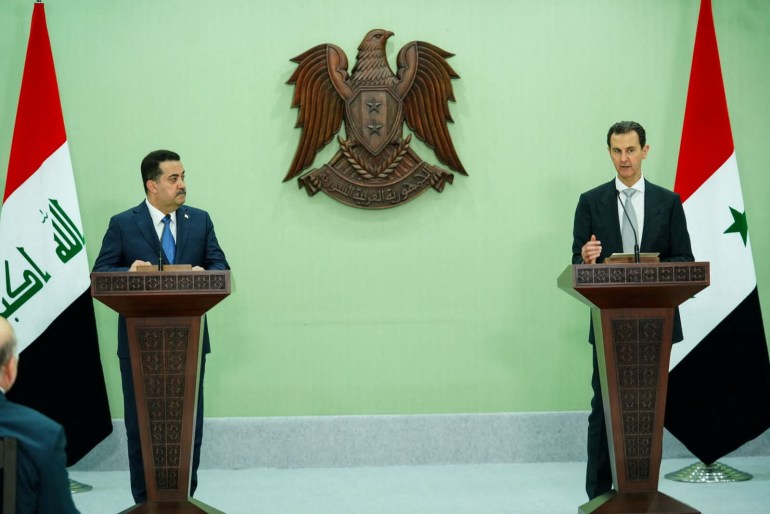The two leaders say they discussed fighting drugs, return of refugees and lifting of Western sanctions imposed in Syria.
Iraq and Syria have maintained close relations for years, even after many Arab countries withdrew their ambassadors from Damascus and Syria’s membership in the 22-member Arab League was suspended because of the brutal crackdown on protesters in 2011.
Assad received Prime Minister Mohammed Shia al-Sudani, who was heading a high-ranking delegation, at the presidential palace in Damascus on Sunday.
The two leaders later told reporters they discussed fighting cross-border drug trafficking, the return of Syrian refugees and the imperative of lifting punitive Western sanctions imposed on Syria.
They also talked about Israeli attacks on the war-torn country and water shortages in the Euphrates, a river which cuts through both countries, because of upstream damming in Turkey.
Al-Sudani said they discussed ways to combat drought conditions in both countries caused by a reduction in rainfall, climate change and upstream damming by Turkey.
“We need to cooperate to get our fair share of water,” Sudani said.
Al-Sudani’s office said the talks also covered how to collaborate to fight “terrorism”.
“We are facing several challenges, first and foremost that of terrorism,” Assad later said at a joint news conference with Sudani.
The two countries, where Iran enjoys wide influence, have a joint 600km-long (373-mile) border.
In June 2014, the ISIL (ISIS) armed group declared the establishment of a self-styled caliphate in wide areas under its control in Iraq and Syria.
After a years-long campaign that left tens of thousands dead in both countries, ISIL was defeated in Iraq in 2017 and in March 2019 in Syria. In recent years, Syrian government forces regained control of much of Syria with the help of Russia and Iran.
Earlier this year, Syria’s membership in the Arab League was reinstated and Assad attended the Arab summit that was held in Saudi Arabia in May.

Al Jazeera’s Mahmoud Abdelwahed, reporting from Baghdad, said: “The significance of this visit lies in the fact that both leaders seem to be keen to build upon the momentum of this visit, to break the isolation the countries have been suffering from for years in the region.”
“Iraq has been a major supporter of Syria. It has supported Syria’s return to the Arab League. Iraq has also been calling on the international community to lift the sanctions imposed on Syria and also to facilitate entry of aid to the Syrian people,” Abdelwahed said.
Syria’s conflict, which started in March 2011, has killed half a million people and displaced half the country’s prewar population of 23 million, including more than 5 million who became refugees.
Iraq is hosting about 250,000 Syrian refugees.
“We are interested in working through official and government channels to solve the issue of refugees and guarantee a safe return for them as soon as the situation becomes stable in places where they reside,” al-Sudani said.
Al-Sudani was invited to visit Damascus during a trip by Syria’s Foreign Minister Faisal Mekdad to Baghdad last month.
The Iraqi prime minister said countries around the world that have citizens in the al-Hol camp in northeast Syria should start working on repatriating them as Baghdad is doing.
Al-Hol camp holds about 51,000 people, including the wives, widows and other relatives of ISIL members. Most are Syrians and Iraqis, but there are around 8,000 women and children from 60 other nationalities who live in a part of the camp known as the Annex. They are generally considered the most diehard ISIL supporters among the camp residents. Many countries are refusing to repatriate their citizens out of concern that they might be a security threat.
